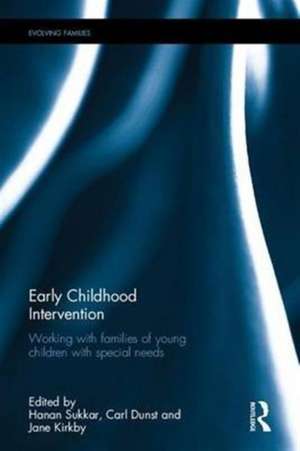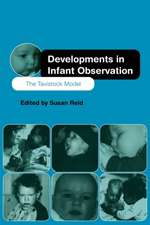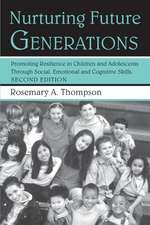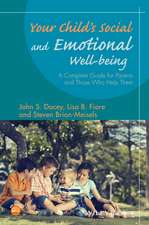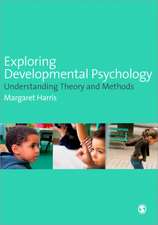Early Childhood Intervention: Working with Families of Young Children with Special Needs: Evolving Families
Editat de Hanan Sukkar, Carl Dunst, Jane Kirkbyen Limba Engleză Hardback – 13 dec 2016
Chapters include:
- Early Intervention for Young Children with Developmental Delays: Contributions of the Developmental Systems Approach
- Family Composition and Family Needs in Australia: What Makes a Family?
- Working with Families in Early Childhood Intervention: Family-Centred Practices in an Individualised Funding Landscape
- Family Systems and Family-Centred Intervention Practices in Portugal and Spain: Iberian Reflections on Early Childhood Intervention
| Toate formatele și edițiile | Preț | Express |
|---|---|---|
| Paperback (1) | 433.68 lei 6-8 săpt. | |
| Taylor & Francis – 14 aug 2018 | 433.68 lei 6-8 săpt. | |
| Hardback (1) | 1274.92 lei 6-8 săpt. | |
| Taylor & Francis – 13 dec 2016 | 1274.92 lei 6-8 săpt. |
Preț: 1274.92 lei
Preț vechi: 1554.78 lei
-18% Nou
Puncte Express: 1912
Preț estimativ în valută:
243.96€ • 255.23$ • 202.66£
243.96€ • 255.23$ • 202.66£
Carte tipărită la comandă
Livrare economică 03-17 aprilie
Preluare comenzi: 021 569.72.76
Specificații
ISBN-13: 9781138918511
ISBN-10: 1138918512
Pagini: 278
Ilustrații: 17
Dimensiuni: 156 x 234 x 20 mm
Greutate: 0.52 kg
Ediția:1
Editura: Taylor & Francis
Colecția Routledge
Seria Evolving Families
Locul publicării:Oxford, United Kingdom
ISBN-10: 1138918512
Pagini: 278
Ilustrații: 17
Dimensiuni: 156 x 234 x 20 mm
Greutate: 0.52 kg
Ediția:1
Editura: Taylor & Francis
Colecția Routledge
Seria Evolving Families
Locul publicării:Oxford, United Kingdom
Public țintă
Postgraduate and ProfessionalCuprins
I.Introduction
1.Family Systems and Family-Centred Practices in Early Childhood Intervention
II.Foundations for Working with Young Children and their Families
2.Early Intervention for Young Children with Developmental Delays: Contributions of the Developmental Systems Approach
3.Family Systems Early Childhood Intervention…Carl J. Dunst
4.Desirable Outcomes Associated With Family-Centred Practices for Young Children with Disabilities
III.Understanding Families and Family-Early Childhood Practitioner Relationships
5.Family Composition and Family Needs in Australia: What Makes a Family?
6.Reimagining Family Partnerships: Shifting Practice From a Focus on Disadvantage to a Focus on Engagement and Empowerment
7.Working with Families to Develop Parent-Professional Partnerships: Implications for Professional Preparation
IV.Working with Families and Young Children in Australia
8.Working with Families in Early Childhood Intervention: Family-Centred Practices in an Individualised Funding Landscape
9.Development of Community-Based Services for Children with Disabilities and their Families
10.Working with Families in Schools
V.Working with Families and Young Children in Other Countries
11.Family Systems and Family-Centred Intervention Practices in Portugal and Spain:Iberian Reflections on Early Childhood Intervention
12.Implementing Family-Centred Practices in Childhood Disability Services in Manitoba, Canada
13.Family Experiences of Early Childhood Intervention Services for Young Children with Speech and Language Needs in England
VI.Conclusions and Future Directions
14.Contributions of Family Systems and Family-Centred Practices for Informing Improvements in Early Childhood Intervention
1.Family Systems and Family-Centred Practices in Early Childhood Intervention
II.Foundations for Working with Young Children and their Families
2.Early Intervention for Young Children with Developmental Delays: Contributions of the Developmental Systems Approach
3.Family Systems Early Childhood Intervention…Carl J. Dunst
4.Desirable Outcomes Associated With Family-Centred Practices for Young Children with Disabilities
III.Understanding Families and Family-Early Childhood Practitioner Relationships
5.Family Composition and Family Needs in Australia: What Makes a Family?
6.Reimagining Family Partnerships: Shifting Practice From a Focus on Disadvantage to a Focus on Engagement and Empowerment
7.Working with Families to Develop Parent-Professional Partnerships: Implications for Professional Preparation
IV.Working with Families and Young Children in Australia
8.Working with Families in Early Childhood Intervention: Family-Centred Practices in an Individualised Funding Landscape
9.Development of Community-Based Services for Children with Disabilities and their Families
10.Working with Families in Schools
V.Working with Families and Young Children in Other Countries
11.Family Systems and Family-Centred Intervention Practices in Portugal and Spain:Iberian Reflections on Early Childhood Intervention
12.Implementing Family-Centred Practices in Childhood Disability Services in Manitoba, Canada
13.Family Experiences of Early Childhood Intervention Services for Young Children with Speech and Language Needs in England
VI.Conclusions and Future Directions
14.Contributions of Family Systems and Family-Centred Practices for Informing Improvements in Early Childhood Intervention
Notă biografică
Hanan Sukkar is the Course Leader for the Bachelor of Early Childhood Education at Holmesglen Institute. Over the last 20 years, Hanan has had extensive experience working with families at risk and children with disabilities. Hanan has operated at director level assisting vulnerable families on welfare in USA and at management level overseeing new migrants in Australia. She has also worked with the Government of Victoria focusing on early intervention, and has held academic positions with Deakin University and Monash University. Hanan has most recently worked as a Senior Associate Research at Semann & Slattery. Hanan’s research draws on early childhood intervention and social evaluation.
Carl J. Dunst is a Senior Research Scientist at the Orelena Hawks Puckett Institute, Asheville and Morganton, North Carolina, USA. He has been involved in research and practice with young children and their families for more than 40 years. This work has included the use of family and social systems frameworks for investigating the direct and indirect effects of informal and formal supports on child, parent, and family functioning, and the use of family-centered practices for improving the outcomes associated with early childhood intervention. This research and practice has resulted in a number of frameworks and models for conceptualizing early childhood intervention practices.
Jane Kirkby is an academic at Monash University, Melbourne where she lectures in English literacies and curriculum, assessment and pedagogy units in teacher education courses. She is an experienced teacher and school leader, having worked across the early childhood, primary and secondary school levels for 30 years. Jane has implemented major school change initiatives, which involved building relationships and capacity with teachers, administration, parents and community stakeholders. Her research focusses on teachers' professional learning, knowledge exchange and mentoring relationships and with current projects being conducted on boundary crossing in the Early Childhood sector.
Carl J. Dunst is a Senior Research Scientist at the Orelena Hawks Puckett Institute, Asheville and Morganton, North Carolina, USA. He has been involved in research and practice with young children and their families for more than 40 years. This work has included the use of family and social systems frameworks for investigating the direct and indirect effects of informal and formal supports on child, parent, and family functioning, and the use of family-centered practices for improving the outcomes associated with early childhood intervention. This research and practice has resulted in a number of frameworks and models for conceptualizing early childhood intervention practices.
Jane Kirkby is an academic at Monash University, Melbourne where she lectures in English literacies and curriculum, assessment and pedagogy units in teacher education courses. She is an experienced teacher and school leader, having worked across the early childhood, primary and secondary school levels for 30 years. Jane has implemented major school change initiatives, which involved building relationships and capacity with teachers, administration, parents and community stakeholders. Her research focusses on teachers' professional learning, knowledge exchange and mentoring relationships and with current projects being conducted on boundary crossing in the Early Childhood sector.
Descriere
This book explores the family-centred practices and systems factors which influence families’ experiences raising children with complex needs. It also considers the ways in which professionals can work with families to build and support parent and child competence. Conceptual and practical work from Australia, Canada, Europe and the United States present descriptions of and implications for different family system frameworks and early-childhood programs. Contributors in this edited volume bring together contemporary information that bridges the research to practice gap in supporting families of young children with disabilities or delays.
